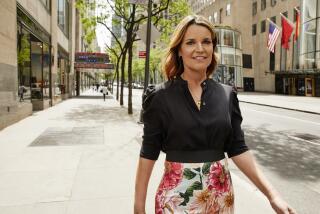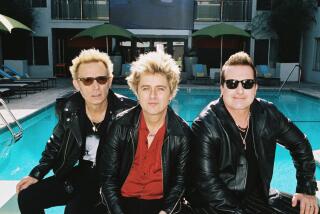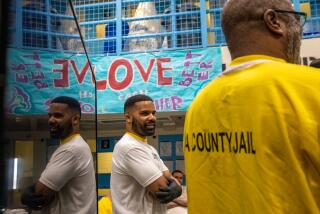She’s found her calling
- Share via
Not long after she left the English convent where she had spent seven years of her young adulthood, Karen Armstrong was invited to a party by fellow students at Oxford University. She could barely hear anyone talk over the din from the stereo, noise that she faintly recognized as music: screaming vocals, screeching guitars, disturbing drums.
What is it? she asked. The Beatles, someone said. Who?
For the record:
12:00 a.m. April 28, 2004 For The Record
Los Angeles Times Wednesday April 28, 2004 Home Edition Main News Part A Page 2 National Desk 0 inches; 35 words Type of Material: Correction
Karen Armstrong -- An article in the April 4 Calendar section about author Karen Armstrong said she had grown up in an Anglo Catholic household. She grew up in England in a Roman Catholic home.
For The Record
Los Angeles Times Sunday May 02, 2004 Home Edition Main News Part A Page 2 National Desk 0 inches; 35 words Type of Material: Correction
Karen Armstrong -- An article in the April 4 Calendar section about author Karen Armstrong said she had grown up in an Anglo Catholic household. She grew up in England in a Roman Catholic home.
It was 1969.
“The world had changed,” Armstrong recalls over coffee on a book-tour swing through the city. “The 1960s had happened in my absence. I was astonished by the youth revolution. It could not have been further removed from my life inside.”
Armstrong left the cloister because she didn’t fit in; outside it was no different. She spent most of the next 25 years trying to find her place in the world, stumbling at almost every turn, a struggle recounted in her new memoir, “The Spiral Staircase.” As she tells it, she failed at more careers than most people try in a lifetime: nun, academic, girls school teacher, TV documentary producer. All the while she suffered blackouts and visions that made her question her sanity.
“My Climb Out of Darkness” is the book’s subtitle. “My Climb Out of a Series of Humiliating Catastrophes so Unrelenting as to Beggar Belief,” Elle magazine suggested would be more like it, calling the book “a minor masterpiece of dry, acerbic autobiography.”
Eventually, Armstrong found success in the one part of life she thought she had left behind when she quit the convent: God, or, more precisely, humanity’s struggle to come to terms with the absolute. Over the last decade, Armstrong has emerged as a bestselling author of books about religion, writing prolifically about Christianity, Islam, Buddhism and the commonalities of faith.
And since Sept. 11, 2001, Armstrong has become a ubiquitous presence in the United States, whether on TV or on interfaith panels discussing religion -- a double irony as she left the nunnery a nonbeliever only to find her true metier in the near monastic life of a highly productive writer on theology.
“I tried a number of different careers,” Armstrong writes in her memoir, out last month from Knopf. “Doors continually slammed in my face until I settled down to my present solitary existence, writing, thinking and talking almost all day and every day about God, religion and spirituality.”
‘I wanted to be changed’
Armstrong, 60, grew up in an Anglo Catholic family that wasn’t especially religious. But as a teenager in 1962, she joined a convent hoping to find a connection to God.
“We went to Mass on Sunday and raced out to enjoy the rest of the day,” she says. “I wanted to be changed, transfigured, enlarged, attain peaceful and Buddha-like serenity.”
She didn’t. Seven years later, Armstrong left the convent, having chafed under the strictures of the cloister without ever achieving enlightenment.
“I was programmed to reject the world,” she says. “We were just scrubbing and cleaning and cooking. We were trained to be good nuns, obedient and submissive.”
At Oxford, her doctoral thesis on the poetics of Tennyson (“So many of his characters seemed walled up in an invincible but menacing solitude, as I was”) was rejected by an examiner who failed to explain why, thus ending any chance of an academic career.
At the same time, Armstrong was tormented by what she thought were mental problems, including blackouts and a sleeping pill overdose that sent her to the hospital. Years of psychiatric counseling didn’t help.
“I had failed as a nun,” she writes. “I had failed as an academic. I was cracking up mentally. I could not see what I could do with the rest of my life.”
Finally, in 1976, a neurologist diagnosed epilepsy, which Armstrong was able to control with medicine. She decided to put religion behind her, writing a memoir about her years as a nun, “Through the Narrow Gate,” published in 1981.
Two years later, a start-up English television network hired Armstrong to host a low-budget documentary about St. Paul -- a job she took because she needed the money. “I was exhausted by religion,” she says. “I wanted nothing to do with it. But I was desperate to make a living.”
The experience proved eye-opening. Armstrong had blundered into the thicket of New Testament scholarship, which was starkly at odds with the simple, doctrinaire religious instruction she had received as a nun.
“We started the rudiments of theology in the convent, very ladylike, nothing challenging,” she says. “Literature was better training. I do see religion as a kind of art form, involving close textual study.”
She asked a Birmingham University religious scholar for help; he advised the producers to get rid of her. “I didn’t know anything,” she admits. “He ripped me apart; he stopped me from ruining the whole project.”
Explaining Islam
Filming in Jerusalem exposed Armstrong to both Judaism and Islam, which gave her a deeper understanding of the Abrahamic tradition. Then in 1988 the TV production company went bankrupt and Armstrong decided to write a book about the three great monotheistic faiths. Publishers weren’t interested.
Eventually, she found a publisher for “A History of God,” which became a bestseller and has been translated into 40 languages, launching Armstrong on a career as one of the most popular religion writers in recent years. The book also marked a circle in her life: She had gone into the convent looking for God, left a skeptic, and finally returned to religion, although not in any orthodox fashion.
“I’m religious,” she says. “But I don’t think belief is important. Religion is about how to behave. I see all the religions on a par. Each has their own genius as well as flaws and difficulties.”
Yet for all her worldly success, Armstrong says she still feels something of an outsider wherever she goes.
“I live a frugal and nun-like life,” says Armstrong, who lives in London. “In a world of coupledom, I’ve never married. I’m religious in a country that is aggressively secular. Here people appreciate my work, but I’m still a foreigner. Whenever I’ve tried to join the mainstream I’ve been ejected by it.”
When the Sept. 11 attacks took place, Armstrong was starting a three-month fellowship at Harvard. Suddenly, she was inundated with calls to explain Islam to America, to tutor members of Congress, to speak in mosques, churches and synagogues across the country.
“Americans are impressive in their desire to learn,” she says. “They dragged everything about Islam off the shelves after 9/11.”
In England, however, Armstrong says the public is largely indifferent to her work.
“I’m far less well known in the U.K.,” she says. “No one is interested in religion there. The U.K. is probably the most secular country in the world after Holland, and the U.S. is probably the second-most-religious country after India.”
Armstrong’s low profile in her homeland will give her a chance to write her next book, a history of the period from 800 BC to 200 BC when the philosophical foundations of the major religions came into being.
“I’ve gone beyond the theistic religions,” she says. “I’m studying Confucius, Taoism, Hinduism and the ancient Greek gods. The book will also critique the way we are religious today. People fall away from the religious impulse. All religions insist on compassion, making room for other people in your heart. But compassion is an unpopular virtue. People would rather be right than compassionate.”
More to Read
Sign up for our Book Club newsletter
Get the latest news, events and more from the Los Angeles Times Book Club, and help us get L.A. reading and talking.
You may occasionally receive promotional content from the Los Angeles Times.










